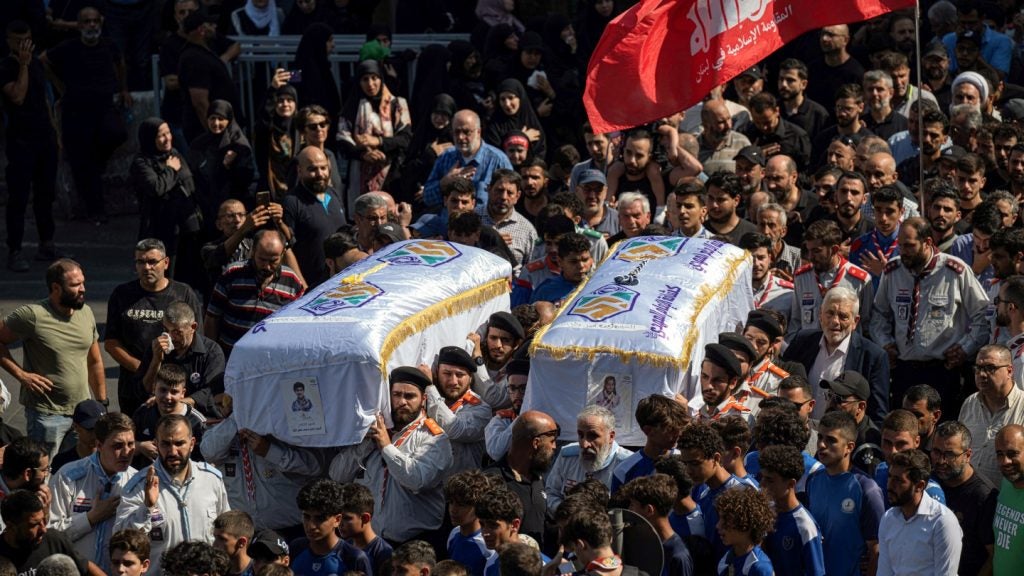Israel’s latest killing spree has eliminated several Hamas and Hezbollah leaders responsible for conflagrating the Gaza conflict – and shattered any last hope of a ceasefire in the process.
Iran’s supreme leader Ayatollah Ali Khamenei has issued an order to directly strike Israel after the Israel Defense Forces’ (IDF) assassinated Hamas’ top political leader Ismail Haniyeh while he attended the inauguration of new Iranian President Masoud Pezeshkian in Tehran yesterday (31 July).
Adding fuel to the fire, Israel earlier today (1 August) confirmed the death of Hamas’ military chief Mohamed Deif, second-in-command after overall leader Yahya Sinwar.
Deif was reportedly killed in an airstrike in Khan Younis on 13 July which Hamas denied at the time. He was viewed as one of the orchestrators behind the 7 October attacks after footage surfaced of his pre-recorded speech announcing the attack.
Turkey, Qatar accuse Israel of sabotaging a ceasefire
On the international stage, there will be little remorse over Deif’s death – but the assassination of Haniyeh will disrupt ceasefire talks and prompt a retaliation from Iran.
Haniyeh was widely regarded as one of Hamas’ most pragmatic leaders and a critical interlocutor during ceasefire negotiations brokered by Qatar, Egypt and the US.
Many in the region have interpreted Israel’s assassination of Haniyeh as deliberately undermining talks aimed at releasing Israeli hostages and ending conflict in Gaza, where Israel has killed more than 39,000 Palestinians since Hamas’ 7 October attacks killed 1,139 Israelis.
Days after Turkish President Recep Tayyip Erdoğan threatened to “enter” Israel over Gaza, Turkey’s Foreign Ministry said the killing of Haniyeh demonstrated “the [Israeli Prime Minister Benjamin] Netanyahu government’s lack of intention to achieve peace”.
Qatar’s Prime Minister Mohammed bin Abdulrahman bin Jassim Al-Thani, meanwhile, said negotiations were impossible if one party assassinates the negotiators of the other party.
Steven Cook, expert at the Council on Foreign Relations, notes that “there is a self-serving quality to his statement”, as it masks the fact that “the Qataris proved incapable of convincing Hamas to agree to a ceasefire through many months of negotiation”.
US Secretary of State Antony Blinken said his country was “not aware of or involved in” Haniyeh’s assassination – marking it as yet another instance of Netanyahu acting against Washington’s wishes.
War with Iran, Hezbollah and Hamas has become a political lifeline for Netanyahu, whose popularity is at an all-time low. Should conflict cease, his far-right coalition government is expected to collapse and trigger elections, currently set for 2026, to be brought forward.
There is also concern that Netanyahu, Israeli Defence Minister Yoav Gallant and the IDF military brass will use these assassinations of Hamas and Hezbollah leaders to justify further airstrikes, despite scores of civilian casualties.
Netanyahu and Gallant already stand accused of intentionally starving civilians as a method of warfare and the murder and persecution of Palestinians by the International Criminal Court (ICC).
Two of the three Hamas leaders which the ICC sought arrest warrants for are now dead.
Sinwar, who is believed to be hiding in the extensive tunnel network below Gaza, stands accused of killing hundreds of civilians, taking at least 245 hostages and acts of sexual violence.
Israel faces a three-pronged retaliation
When Israel killed a top Islamic Revolutionary Guard Corps (IRGC) leader in Syria in April, Iran responded by launching hundreds of rockets and missiles in an unprecedented aerial attack on Tel Aviv.
Tehran’s retaliation may be more forceful this time around. In April, Khamenei alerted the world of Iran’s plans before it attacked Israel, whereas now his order for a direct hit on Israel was only revealed by unauthorised Iranian officials, the New York Times reported.
As Iran and Hamas plan revenge for the deaths of Haniyeh and Deif, a third entity along the so-called ‘Axis of Resistance’ is also likely to be plotting retaliation for a separate killing: Lebanese political militia Hezbollah.
Hezbollah and the IDF have been exchanging blows along Israel’s northern border since 8 October. Their conflict came to a head on Tuesday (30 July) when Israel claimed to have assassinated Hezbollah’s top military commander Fuad Shukur in an airstrike in southern Beirut which saw regional airspace all but close. Shukur was the right-hand man to Hezbollah commander-in-chief Hassan Nasrallah.

Israel said the assassination was in response to last week’s airstrike on Majdal Shams, a Druze-populated town in the Israeli-occupied Golan Heights. 12 children were killed while playing on a soccer field.
Hezbollah spokesperson Mohamad Afif acknowledged strikes on the Golan Heights but continues to deny responsibility for the Majdal Shams deaths. So far, more than 450 people have been killed in Lebanon, estimated at roughly 350 Hezbollah fighters and at least 100 civilians.
All eyes now turn to Iran’s imminent retaliation, and whether Tehran enlists Hezbollah, Hamas or the Houthi militia in Yemen to fire on Israel from multiple fronts.









